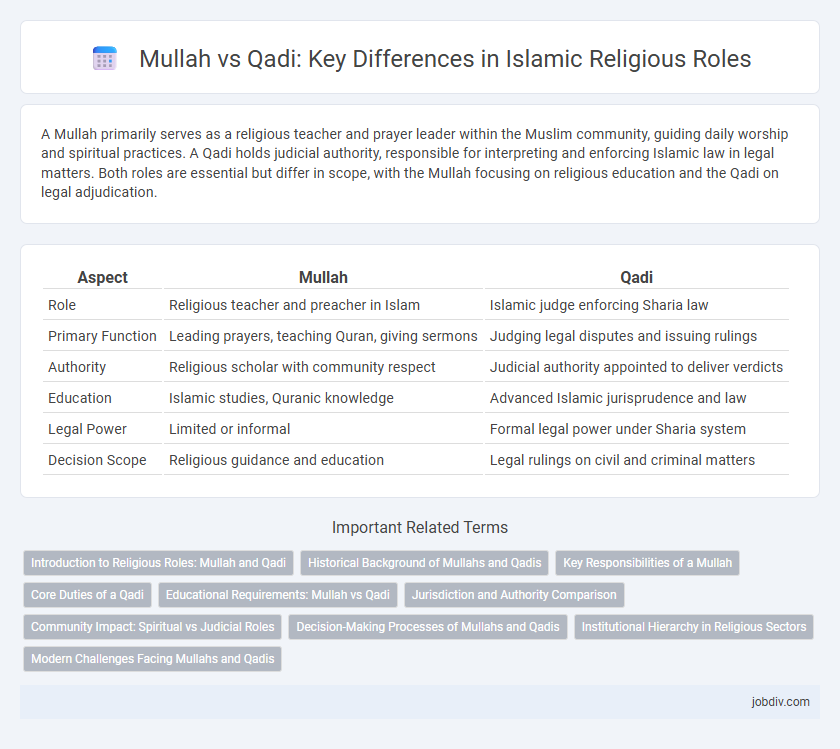A Mullah primarily serves as a religious teacher and prayer leader within the Muslim community, guiding daily worship and spiritual practices. A Qadi holds judicial authority, responsible for interpreting and enforcing Islamic law in legal matters. Both roles are essential but differ in scope, with the Mullah focusing on religious education and the Qadi on legal adjudication.
Table of Comparison
| Aspect | Mullah | Qadi |
|---|---|---|
| Role | Religious teacher and preacher in Islam | Islamic judge enforcing Sharia law |
| Primary Function | Leading prayers, teaching Quran, giving sermons | Judging legal disputes and issuing rulings |
| Authority | Religious scholar with community respect | Judicial authority appointed to deliver verdicts |
| Education | Islamic studies, Quranic knowledge | Advanced Islamic jurisprudence and law |
| Legal Power | Limited or informal | Formal legal power under Sharia system |
| Decision Scope | Religious guidance and education | Legal rulings on civil and criminal matters |
Introduction to Religious Roles: Mullah and Qadi
Mullahs serve as Islamic scholars and religious leaders, primarily responsible for guiding community members in spiritual matters, teaching Islamic law (Sharia), and leading prayers. Qadis function as judicial authorities who interpret and enforce Sharia law by resolving disputes, issuing legal rulings, and overseeing Islamic courts. Both roles are integral to maintaining religious order and legal compliance within Muslim communities, with Mullahs focusing on education and worship, while Qadis administer justice.
Historical Background of Mullahs and Qadis
Mullahs historically served as Islamic scholars and community leaders, responsible for teaching religious texts and guiding spiritual practices, primarily within Sunni Muslim communities. Qadis functioned as judicial authorities appointed to interpret and enforce Sharia law, settling disputes and administering justice based on Islamic jurisprudence. The distinct roles of Mullahs and Qadis evolved across different Islamic empires, reflecting varied religious, legal, and social frameworks.
Key Responsibilities of a Mullah
A Mullah primarily leads religious prayers, delivers sermons, and provides Islamic education to the community. They interpret religious texts, offer spiritual guidance, and oversee rituals such as marriages and funerals. Unlike a Qadi who adjudicates legal disputes based on Sharia law, a Mullah focuses on pastoral care and religious instruction.
Core Duties of a Qadi
The core duties of a Qadi center on delivering judicial decisions in accordance with Islamic law, including resolving disputes, adjudicating criminal and civil cases, and ensuring justice within the Muslim community. Unlike a Mullah, who primarily serves as a religious teacher and spiritual guide, a Qadi functions as an official judge appointed to interpret Sharia law and enforce it legally. The Qadi's role is critical in maintaining legal order and upholding the principles of Islamic jurisprudence in courts.
Educational Requirements: Mullah vs Qadi
Mullahs typically undergo religious education focused on memorizing and interpreting the Quran, Hadith, and Fiqh through traditional madrasa systems, emphasizing spiritual guidance and community leadership. Qadis require advanced, formal training in Islamic jurisprudence (Fiqh) and the Sharia legal framework, often including certification from recognized Islamic law institutions to adjudicate and issue binding legal rulings. The educational path for Qadis is more specialized, combining theological knowledge with legal expertise to ensure accurate application of Islamic law in judicial matters.
Jurisdiction and Authority Comparison
Mullahs primarily exercise religious authority by interpreting Islamic teachings and leading local worship, often focusing on community-level guidance and education. Qadis hold formal judicial jurisdiction within Islamic legal systems, empowered to adjudicate civil and criminal cases according to Sharia law. The authority of Qadis is typically state-recognized or institutionally sanctioned, whereas Mullahs derive influence mainly from religious scholarship and spiritual leadership.
Community Impact: Spiritual vs Judicial Roles
Mullahs primarily serve as spiritual guides within the community, leading prayers, delivering sermons, and providing religious education to deepen faith and moral values. Qadis, on the other hand, function as judicial authorities who interpret and enforce Islamic law, resolving disputes and ensuring legal compliance according to Sharia. The distinct roles of mullahs and qadis significantly shape community cohesion by balancing spiritual guidance with judicial governance.
Decision-Making Processes of Mullahs and Qadis
Mullahs and Qadis differ significantly in their decision-making processes within Islamic law; Mullahs primarily rely on religious texts and scholarly interpretation to provide guidance and fatwas, emphasizing theological principles. Qadis serve as judicial authorities who implement Sharia law in courts, making binding legal decisions based on evidence, precedent, and community norms. The Qadi's rulings hold enforceable legal status, while Mullahs offer advisory opinions influencing moral and religious behavior.
Institutional Hierarchy in Religious Sectors
Mullahs serve primarily as religious scholars and teachers within Islamic communities, responsible for interpreting religious texts and providing spiritual guidance. Qadis hold judicial authority, presiding over Sharia courts and making legal rulings based on Islamic law, positioning them higher in the institutional hierarchy of religious sectors. The hierarchy typically places Qadis above Mullahs due to their formal legal authority and role in adjudicating religious and civil disputes.
Modern Challenges Facing Mullahs and Qadis
Mullahs and Qadis face modern challenges such as navigating the tension between traditional Islamic jurisprudence and contemporary legal systems, addressing the needs of increasingly diverse and educated Muslim communities, and combating misinformation disseminated through digital platforms. Their roles require adapting religious interpretations to align with human rights standards while maintaining legitimacy within their communities. Technological advancements also demand these religious scholars to engage in interfaith dialogues and participate in socio-political debates more actively than before.
Mullah vs Qadi Infographic

 jobdiv.com
jobdiv.com